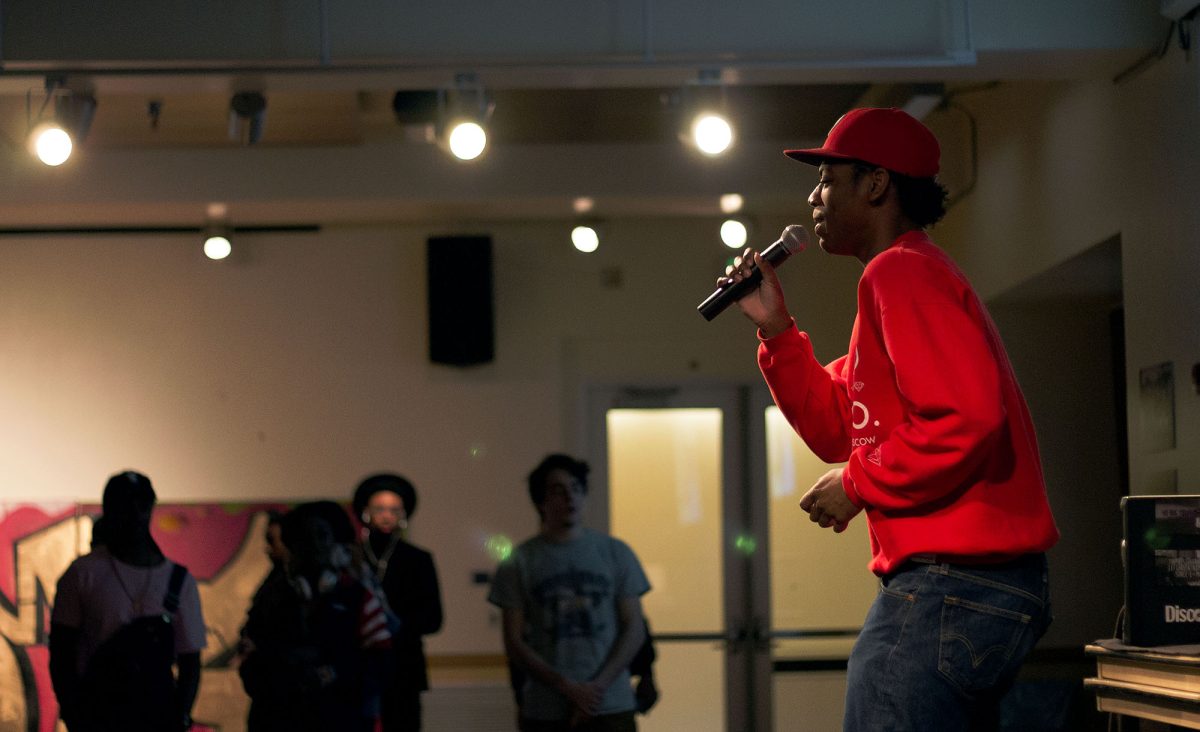Q&A with the founder of France’s first women and trans open mic.
Words by Hannah Steinkopf-Frank, photos by Teresa Suárez and Marie Rouge
For 26-year-old Eiram*, it was being called “selfish” by a middle-aged White man that inspired her to start France’s first women and trans open mic, aptly named Self-ish. Eiram, who grew up in Singapore and France, first became interested in feminism while studying at Swarthmore College. After moving back to Paris, she began performing songs and poems at open mics, but found the sexism she dealt with to be so oppressive that she and other artists did not feel comfortable baring their souls in front of a crowd.
Since the first Self-ish open mic nine months ago, the events have grown from crowds of a few dozens to a few hundred. This is possibly because, compared to their American counterparts, France’s queer and feminist communities do not have as many opportunities to come together. There are gathering places, whether that’s a hole-in-the-wall lesbian bar blasting American pop music or monthly dance parties at the Moulin Rouge Machine, where people of all genders and sexualities get down until the sun comes up, literally. But Self-ish has provided a new space for marginalized groups to let their voices be heard. For Eiram, it is a safe place for people to both escape and share the sexism and racism they deal with in France on a daily basis. Below, she discusses her own journey of becoming a feminist, the unique sexism women in France deal with, and her dreams for the future of Self-ish.
*Eiram prefers to use her stage name in coverage of Self-ish.
Q: How were you first introduced to feminism?
A: That’s a big question right there. It was actually really funny because when I got in college, I had absolutely no interest in gender or sexuality or feminism, whatsoever. In high school, I was one of those really gender normative teens and went shopping with my friends and was subscribed to two different women’s magazines. That’s how deep I was in the patriarchy. I discovered feminism when I was in college. I went to a small liberal arts college, and my friend said, “Oh there’s this gender course,” which was called Comparative Perspectives on the Body, “and you should take it. It’s really great.” So I did, and that was my first insight into feminism. I started questioning all these norms that I was brought up in, in terms of my behavior, in terms of my appearance. Like all baby feminists, I became very angry because I realized that a lot of the things that I did were actually being imposed on me. I realized that a lot of them were actually making me very unhappy. That was what really got me going on feminism.
Q: Is there something specific about open mics, that there’s so much sexism or is it just general sexism that’s found in many cultures?
A: I don’t know. I think both. I think the patriarchy, in general. But I think it’s also just sadly in the realm of the arts as well. Men have had a lot of control. You still see it even in other industries. I’m really into comics, and in terms of comics, most comic publishers are men. The world of the arts also has a long way to go not in terms of the visual arts or writing. With any kind of artistic endeavor, men still have the upper hand. Sadly, that’s also totally mirrored by a lot of the open mic scene, where it’s mostly men who start these open mics and then they’re in control. Often, they abuse their power. That’s how these places become unsafe for people who are not as privileged.
Q: Do you think that the sexism women deal with in France is different than in the U.S.?
A: Yeah, totally. I think in France, people think the patriarchy isn’t a thing. I think in the U.S. there’s way more talk about gender and sexuality, and so on and so forth. Even the people who don’t really understand what feminism is or aren’t friendly towards feminism, know that it somehow has some kind of bearing in culture. I think people understand its legitimacy in some way, even if they’re not necessarily friendly towards it in the U.S. Whereas I feel in France, people are in complete denial. They’re oblivious. So I think to me, that’s the main difference: There’s some kind of awareness that’s lacking in France, and there’s still a long way to go in that regard.
Q: Why do you think Self-ish has grown so much?
A: Well it’s interesting. Every time I talk to people about it or every time people come up to me, they always say the same thing: “You know this was clearly lacking.” This is why it’s so successful because clearly, people had this need to express themselves and to really bare their souls, but they didn’t really have a space to do that. Especially when you identify as a woman or as trans, you are subjected to certain types of discrimination in society at large. It’s really hard to get up onstage and talk about these things to an audience that doesn’t necessarily understand what you’re talking about or isn’t necessarily friendly towards expressing the discriminations that you are experiencing. So I think that’s why people like Self-ish so much, because they can actually be their true selves.
Q: Has there been a particular Self-ish performance that has stuck with you?
A: We have a really young ‘slammer’ who’s a slam poetry artist called Helen, who’s now part of the Self-ish team. When she first came on stage, she prefaced her slam by saying that she had been to Self-ish a few times and that she had been really inspired by the people going on stage. That’s how she had written her piece. In her piece, she talked about finding herself and coming into her own as a queer-identified person and as a feminist. Just hearing that, hearing that Self-ish had a real concrete impact on someone, especially someone so young, was really moving. You put on these events and people come, and then they go home. You have no way of knowing exactly how they’re impacted unless they tell you. So hearing that was amazing.
Q: Can you talk about how racism is different in France?
A: There’s no PC [politically correct] culture here. People just say things. They refer to certain ethnicities with certain terms that are clearly derogatory, and they actually see nothing wrong with it. It’s so steeped in French culture. I don’t really know how to explain it, but there’s definitely no awareness of race, and there’s definitely less awareness of racism. I think in France, there’s way less of a conversation around race because France has been very adamant about basing the whole French identity around being French. You’re either French or you’re not, and there’s actually no space for other types of identities. Whereas in the US, you can be Asian-American or you can be African-American. You can combine those two different identifies. I feel that’s very limited, and it erases a lot of the diversity that exists in France.
Q: What do you like about hosting Self-ish?
A: It’s so much fun. It’s also very stressful, but I love being able to show that I care. I think I’ve cared for a long time about feminism, gender and sexuality, and the patriarchy, but I’ve never been able to be very open about that in a public forum. To be able to go onstage and just be myself and be very visible as a feminist and as a queer person, and also being recognized as such [is validating]. I’m not going to lie, there is a pleasant aspect to being recognized as an activist. That’s been very rewarding.
Q: I know French language is a lot more gendered, something possibly related to sexism in France. Does gender neutral language exist in French like it does in English?
A: Oh my god yes, because that was definitely one of the things that I had to work with in terms of starting to host Self-ish in French. I think maybe that was something I was trying to avoid by hosting it in English [at first]. In French it’s a lot harder to be gender neutral. It was a learning curve, but I learned quite fast. There’s one gender neutral pronoun in French, which is ‘iel” or “ielle.” It’s a combination of “il” and “elle,” – “he” and “she” in French. So I started using that and also writing with gender neutral language for all of our social media, for our online presence. I think that the biggest challenge was hosting in French and using gender neutral language. Because in French, for adjectives that are gendered, the only way to be gender neutral is just to say both. So you end up having to be very careful about using adjectives that are not gendered or using both the feminine and masculine of the adjectives. That’s been a challenge, but I’m happy that’s something I’ve learned to do.
Q: Why do you think creating these safe spaces is particularly important now, given the fears some have about rising conservatism in France with the far right political party le Front National?
A: The more people that experience oppression, the more their need to communicate about that oppression becomes essential to their survival. I think it really does help people to speak out. It helps people to surmount adversity if they can at least talk about the discrimination and all of the problems that they’re faced with. I do feel like language and speech and expression are such crucial tools for survival. So I’m hoping spaces like Self-ish help people “survive” with their ambitions and their hopes and their dreams and what they wish to accomplish.
Mécistée Rhéa, who describes herself as an artist, model, and actress read a 1965 letter from artist Sol LeWitt to sculptor Eva Hesse that explores how to overcome barriers in the creative process. “Learn to say “Fuck You” to the world once in a while. You have every right to,” writes LeWitt.















